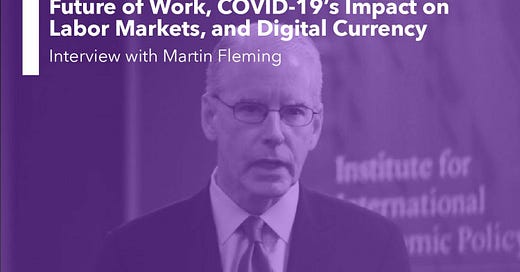IBM Chief Economist Martin Fleming discusses Covid-19’s immediate impacts on labor markets and the long-term trends for the future of work – from automation to artificial intelligence. Given how millions of people have to work from home today, there have been countless research reports springing up talking about “the end of work as we know it.” Some of us at Policy Punchline have always been skeptical about those futuristic claims that portray an utopian image filled with tech innovations but do not seek to present any concrete path on how to get there. If you have the same skepticism, hopefully some of that can be answered by Dr. Fleming. IBM has long been known for spearheading corporate research and offering forefront business solutions in technology and beyond. Dr. Fleming tells us about the creation of IBM’s Watson, its unique partnership with MIT to jointly research artificial intelligence, as well as other recent innovations in cognitive systems and machine learning meant to aid human decision-making. We talk about IBM’s long history in funding and leading in fundamental science and tech research, and how Dr. Fleming fits in this grand picture as a PhD economist. Given the rising importance of artificial intelligence and data science, the world of major tech corporations has seen the “rise of data scientists.” Satya Nadella at Microsoft, Sundar Pichai at Alphabet, Shantanu Narayen at Adobe — and just recently from April 2020 onwards, Arvind Krishna at IBM… These are four Indian-born executives who were trained as engineers and rose through the ranks in technical positions. Their backgrounds are very much different from the stereotypical corporate America managers’ background – in sales and general management after receiving MBA degrees – such as Ginni Rometty, IBM’s previous CEO for the last eight years. Dr. Fleming talks about such fundamental sea change across companies, as well as how young students can take advantage of data science education as early as high school. The disruptions to labor markets by Covid-19 have been dramatic, but most major changes don’t happen overnight. Dr. Fleming cautions us to separate long-term trends in AI from recent changes ushered in by the fear for viruses. We dig deeper into the economic impacts of automation – how its negative impacts on low-income workers might not be necessarily even across the world. Developing countries, in particular, are the most susceptible to losing areas of the work that have been popular in the past, like call centers. On the other hand, middle-tier workers are the most affected in the U.S., while high and low income workers have seen the most robust growth in job opportunities. Dr. Fleming has paid close attention to how digital currencies are taking form in many countries around the world – Singapore, China, Canada, and notably Facebook’s Libra, though many of these moves have not been successful. The notion that the Federal Reserve could release their own digital currency is becoming increasingly plausible. Digital currencies, however, are different from cryptocurrencies like Bitcoin. One practical reason for this transformation to digital currency is how the act of making payments has become inefficient, compared to the immediacy of other tasks, like sending emails or ordering a product. This is a growing danger that if such inefficiencies persist, the international dominance of the dollar could be reduced. However, with such a technological push, Dr. Fleming emphasizes the potential risks and how it could affect financial institutions that derive their income from controlling payment processes.
1×
0:00
Current time: 0:00 / Total time: -1:16:48
-1:16:48
IBM Chief Economist Martin Fleming: Future of Work, Covid's Impact on Labor Market, Digital Currency
Jul 23, 2020














Share this post